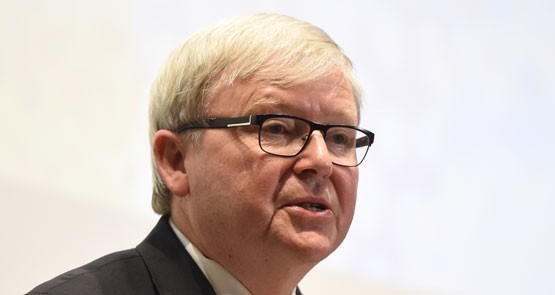
Kevin Rudd’s bid for secretary general of the UN is picking up speed, with well-timed visits to important leaders and a research paper to get into China’s good books (he has to make up for calling the Chinese “ratfuckers”, after all).
Rudd’s ambition for the job has not been in doubt, but until now, his chances of overcoming intricate geo-political barriers seemed slim. But Crikey understands that Rudd is looking increasingly likely to get elected secretary general by the end of the year, after years of shrewd campaigning. While other names, such as Bulgarian Irina Bokova, are getting much more attention, Crikey understands that in the event that a candidate from the Eastern European countries is vetoed, Rudd is positioning himself as a “compromise candidate”.
Rudd’s road this far hasn’t been simple, and it is understood that he has four to five staff in New York working specifically on snagging him the world’s top diplomatic post. In the past two years Rudd has made a few strategic moves to beef up his CV. The former PM:
- Became president of the Asia Society Policy Institute, based in New York;
- Became chair of the Independent Commission on Multilateralism;
- Wrote a paper for the Harvard Kennedy School of Government on “Alternative Futures for US-China Relations” (trying to make up for that “ratfuckers” comment?);
- Met with Russian President Vladimir Putin’s foreign policy adviser, and French President Francois Hollande; and
- Travelled to China multiple times.
To become secretary general, a candidate has to be recommended to the General Assembly by the Security Council. In the past, the 15 Security Council nations have put forward just one candidate, sometimes after one of the five permanent member states has vetoed previous nominees. Professor Ramesh Thakur from Australian National University explains that as UN practices are based on “equitable geographic representation”, this year’s nominee is expected to come from the “Western European and Others” group, which includes Eastern European countries, which believe it is their turn to be represented in the role. Australia is also included in this grouping.
Thakur says that this could work in Rudd’s favour. “The problem there is that someone who is favoured by the Russians is likely to be vetoed by the Western states and someone that the Western countries like will be vetoed by the Russians.”
There has also been a strong push for the next secretary general to be a woman, as a woman has never held the role. “It’s an increasing embarrassment,” said Thakur.
For the first time, the General Assembly has released a set of desired qualifications and attributes for the role, including extensive international relations experience, experience in the United Nations and a diplomatic record.
While Rudd doesn’t fit two of the main unofficial criteria for the job, he is making inroads in wooing members of the Security Council to stake his claim.
The process for electing a new secretary general is not straightforward, with practices developed over the history of the UN, even though the charter is vague. The UN has made moves to make this process more transparent than it has been in the past.
Current UN boss Ban Ki-moon is due to step down at the end of this year, with the process to choose his replacement to take up much of the next 12 months. Like Ban in 2006, Rudd has made a few strategic moves to increase his hold on the gig. Ban faced criticism for his campaign, which involved visiting every country that sat on the Security Council while he served as South Korea’s foreign minister. Like Rudd, when Ban announced his candidacy for the job, he wasn’t taken seriously, as he wasn’t forceful enough. According to a profile of Ban in the Financial Times published at his nomination, he gets by on five hours sleep a night and rarely takes days off (sound like anyone you remember?).
Rudd’s ambition for the role has been reported in Australian media for some time, but his name has only recently been mentioned in overseas media. The traits that hampered his prime ministership have not gone unnoticed though, with one list of the contenders noting “he has a reputation for being difficult to work with — and might not get the backing of the current Australian government”.
Thakur says Rudd is looked upon more favourably overseas than he is in Australia. “I think we have to remember that his international reputation is considerably higher than his reputation in this country,” he said. Thakur says Rudd’s “engaging personality and his bright mind” have won him fans overseas.
A competitor to Rudd, whose chances would also improve if a compromise candidate were needed, is former New Zealand prime minister Helen Clark. Clark is the Administrator of the United Nations Development Program, and is also in the Western European and Others group. Campaigning for the role will continue throughout multilateral events this year. Interestingly, Clark and Rudd are both at the World Economic Forum in Davos this week.








Crikey is committed to hosting lively discussions. Help us keep the conversation useful, interesting and welcoming. We aim to publish comments quickly in the interest of promoting robust conversation, but we’re a small team and we deploy filters to protect against legal risk. Occasionally your comment may be held up while we review, but we’re working as fast as we can to keep the conversation rolling.
The Crikey comment section is members-only content. Please subscribe to leave a comment.
The Crikey comment section is members-only content. Please login to leave a comment.